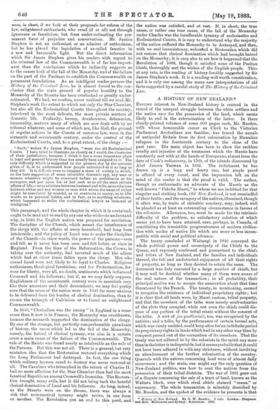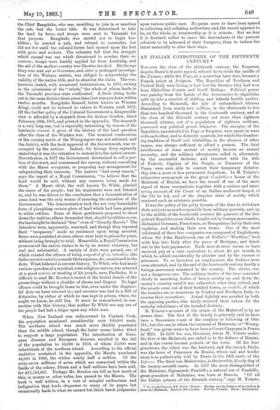A HISTORY OF NEW ZEALAND.* Exousu interest in New-Zealand history
is centred in the record of the unequal struggle between the white settlers and the native race for the possession of the land, which seems likely to end in the extermination of the latter. In three closely-printed volumes of some 600 pages each, Mr. Rusden, with whose honourable career as Clerk to the Victorian Parliament Australians are familiar, has traced the annals of antipodal Britain from its first colonisation by Hawaiian refugees in the fourteenth century to the close of the past year. His main object has been to show the reckless cruelty and injustice of the treatment which the Maoris have constantly met with at the hands of Europeans, almost from the date of Cook's rediscovery, in 1769, of the islands discovered by Abel Jansen Tasman in 1642. The indictment he has drawn up is a long and heavy oue, but ample proof is offered of every count, and the impression left on the mind of the reader is that the proof is valid. The author, though as enthusiastic an advocate of the Maoris as the well-known "Pakeha Maori," to whom we are indebted for that singular and striking book, Old New Zealand, is not unmindful of their faults ; and the savagery of the natives, illumined, though it often was, by traits of chivalric courtesy, may, indeed, well be pleaded as at least an extenuating circumstance in favour of the colonists. Allowance, too, must be made for the intrinsic difficulty of the problem, no satisfactory solution of which seems yet to have been attained, save, perhaps, in Canada, of conciliating the irresistible progressiveness of modern civilisa- tion with modes of native life which are more or less incom- patible with social and political advance.
The treaty concluded at Waitangi in 1840 conveyed the whole political power and sovereignty of the Chiefs to the Queen, and expressly confirmed and guaranteed to the chiefs and tribes of New Zealand, and the families and individuals thereof, the full and undisturbed enjoyment of all their rights of property, as long as they desired to retain the same. The document was duly executed by a large number of chiefs, but it may well be doubted whether many of them were aware of the real nature of the transaction ; iu all probablity, their principal motive was to escape the annexation about that time threatened by the French. The treaty, in mentioning, seemed to recognise the existence of individual proprietary rights ; but it is clear that all lands were, by Maori custom, tribal property, and that the members of the tribe were merely nsufructuaries of the plots they occupied, while not even the chiefs could dis- pose of any portion of the tribal estate without the consent of the tribe. A sort of jus postliminii, too, was recognised by the natives ; and a tribe, by the performance of certain formal acts, which was rarely omitted, could keep alive fof an indefinite period its proprietary rights in lands which had in any other way than by conquest passed out of the occupation of its members. That the treaty was not adhered to by the colonists in the spirit any more than in the letter is indisputable, but- it seems probable thatit could not have been adhered to with any strictness, without involving an abandonment of the further colonisation of the country. Quarrels with the natives concerning land were of almost daily occurrence ; and the main, one might say the only question of New-Zealand politics, was how to oust the natives from the possession of their tribal districts. The war of 1861 grew out of a dispute concerning the sale of a tract of land, known as the Waita'ra block, over which rival chiefs claimed "mama," or supremacy. The whole transaction is minutely described by Mr. Rusden, and the upshot of the evidence he presents is that • History of New Zealand. By G. W. Bogdan. 3 vols. London: Chapman and Hall. Melbourne and Sydney : Robertson. MS.
the Chief Rangitake, who was unwilling to join in or sanction the sale, had the better title. It was determined to take the land by force, and troops were sent to Taranaki for that purpose. Rangitake -was careful not to begin hos- tilities ; he erected a pab, and refused to surrender, but did not fire until the colonial forces had opened upon the fort with guns and rockets. The colonists felt that the struggle which ensued was one which threatened to overtax their re- sources ; troops were hastily applied for from Australia, and the aid of the mother-country was likewise invoked. Sir George Grey was sent out as Governor, and, after a prolonged investiga- tion of the Waitara matter, was obliged to acknowledge the validity of the native title, and to abandon the claim. The war, however, lasted, with occasional intermissions, to 1865, ending in the submission of the " rebels," the whole of whose lands in the Taranaki province were confiscated. A fresh rising broke out in the same district three years later, but was put down within twelve months. Rangitake himself, better known as Wiremn Kingi, could not be induced to return to Waitara until 1872. Of the further policy of the Colonial Government a disagreeable view is afforded by a despatch from Sir Arthur Gordon, dated February 26th, 1881, and printed in the appendix. The despatch is a very long one, but is especially interesting by reason of the luminous resume it gives of the history of the land question -after the close of the Waitara war. The nominal confiscation of the country north of the Waingongoro was not enforced, and the district, with the tacit approval of the Government, was re- occupied by the natives. Indeed, Sir George Grey expressly stated that it was the intention to restore it to the native owners. Nevertheless, in 1877 the Government determined to sell a por- tion of this tract, and commenced the survey, without consulting with the Maori occupants, or proposing any arrangement for safeguarding their interests. The natives " had every reason," says the report of a Royal Commission, " to believe that the land would be sold, without any reserves being made for them." A Maori chief, the well known Te 1Vhiti, pleaded the cause of his people ; but his arguments were not listened to, and he was driven to the conclusion that a demonstration of some kind was the only means of arousing the attention of the Government. The demonstration took the not very formidable form of ploughing certain plots of land which had been granted to white settlers. Some of these gentlemen proposed to shoot down the natives, others demanded that, should hostilities occur, the land might be declared " free " even of "friendly Maoris." The intruders were, apparently, unarmed, and though they repeated their " trespasses," made no resistance upon being arrested, Some were punished at once, others were kept in prison for years, without being brought to trial. Meanwhile, a Royal Commission .pronounced the native claims to be by no means visionary, but real and substantial. A variety of Acts were passed, one of which created the offence of being suspected of an intention (the italics are not ours) to commit the trespasses, dx., mentioned in the Acts. What followed is current history. Te Whiti, who had made various speeches of a mystical, semi-religious nature, was arrested at a great ',name, or meeting of his people, near Parihaka. It is difficult to read Mr. Rusden's record of the brutal details of the proceedings without a shudder of shame and disgust. No legal offence could be brought home to him, even under the disgrace- ful Acts we have referred to ; and recourse was had to a Bill of Attainder, by virtue of which he was kept in prison, where, for aught we know, he still lies. It must be remembered, in con- nection with this history, that neither Te Whiti nor any one of his people had laid a finger upon any white man.
When New Zealand was rediscovered by Captain Cook, the population numbered considerably over 100,000 souls. The northern island was much more thickly populated than the middle island, though the latter seems better fitted to support a large population. The introduction of Euro- pean diseases and European firearms resulted in the fall of the population to 56,000 in 1858, of whom 53,000 were inhabitants of the northern island. According to the official statistics contained in the appendix, the Maoris numbered 44,000 in 1880, the whites nearly half a million. Of the sixty-seven millions of acres which are comprised, within the limits of the colony, fifteen and a half millions have been sold, for £11,524,867. Perhaps Mr. Roam can tell us how much of this, in money or other value, has passed to the Maoris. The book is well written, in a vein of mingled enthusiasm and indignation that lends eloquence to many of its pages, but occasionally leads to what we cannot but think harsh judgments
upon various public men. No pains seem to have been spared. in collecting and collating authorities, and. the record appears to be, on the whole, as trustworthy as it is minute. But we fear it is destined rather to cause the descendants of the present colonists to be ashamed of their foregoers, than to induce the latter materially to alter their ways.



































 Previous page
Previous page